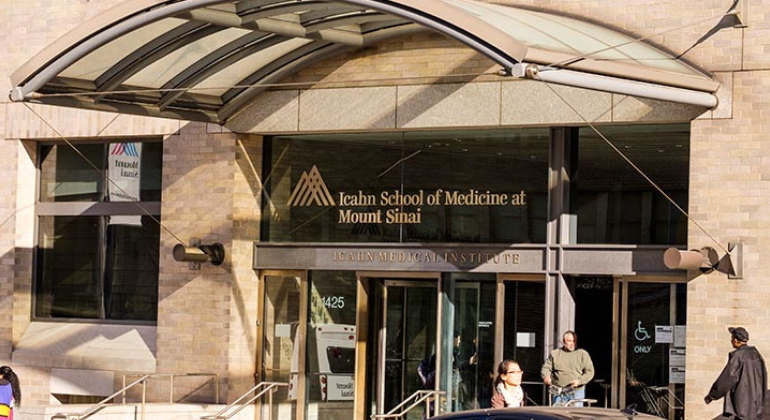Mount Sinai Institute for Liver Research Established to Advance Understanding and Treatment of Liver Disease Amid Global Concerns
Liver cancers—hepatocellular carcinoma and intrahepatic cholangiocarcinoma—have the fastest rising incidence of any neoplasm worldwide

To advance the understanding and treatment of liver disease by pursuing innovative, transformative basic and translational research, leaders at the Icahn School of Medicine at Mount Sinai have formed the Mount Sinai Institute for Liver Research. The Institute will bring together a broad range of experts across the spectrum of diseases involving the liver, incorporating more than 90 investigators across 23 disciplines, who will work together to identify novel pathways, models, and therapeutic targets.
“We are very pleased to announce that the Institute for Liver Research will provide a multidisciplinary program focused squarely on perhaps the most complex and poorly understood organ apart from the brain,” says Institute Director Scott L. Friedman, MD, Chief Emeritus of the Division of Liver Diseases at Mount Sinai Health System.
The Institute will explore basic principles of cell growth and repair to better understand cellular signaling pathways and to develop fundamental insights into the diagnosis and treatment of liver disease, says Dr. Friedman, who is also Irene and Dr. Arthur M. Fishberg Professor of Medicine and Dean for Collaborative Research and Partnerships.
“The time is now to double down on what we know already to develop new pathways and new treatments for liver disease. Of deep concern is that liver cancer—comprising hepatocellular carcinoma, the most common form, and intrahepatic cholangiocarcinoma, a rarer form of cancer arising from the bile ducts—has the fastest-rising incidence of any steatotic (fatty) disease in the world, and current treatments are inadequate. We also need to address this concern in the context of the rising incidence of steatotic liver disease, which affects more than one third of the U.S. and world population,” says Dr. Friedman.
Currently, more than 1.5 billion individuals throughout the world have chronic liver disease, including chronic hepatitis B and C and steatotic liver disease. All of these diseases lead to inflammation, fibrosis, and liver cancer.
“Thanks in part to pioneering efforts in the basic and clinical investigation in liver disease, the field is ripe for breakthroughs that will revolutionize the treatment of many chronic liver diseases,” says Institute Associate Director Meena B. Bansal, MD, System Chief of the Division of Liver Diseases. Dr. Bansal, a Professor of Medicine (Liver Diseases) at the Icahn School of Medicine, leads the institution’s rapidly growing MASH (metabolic dysfunction-associated steatohepatitis) Center of Excellence, which oversees a growing range of cutting-edge clinical trials and clinical-translational research studies.
There are several significant unmet scientific needs in liver research where progress will be expedited through the muscle of Mount Sinai’s inter-disciplinary teams. These areas include the role of the microbiome in liver biology and pathobiology; immune regulation of primary and metastatic liver cancer; mechanisms of fibrosis shared across organs and organ-to-organ crosstalk in metabolic dysfunction; the scientific basis for liver regeneration, and the role of desmoplasia, the formation of scar tissue in cancer pathogenesis and treatment, and in neonatal and developmental liver diseases.
The past three decades have witnessed exciting advances in antiviral therapies for hepatitis B, C, and delta. Most patients are now responsive to antiviral therapy and hepatitis C is curable in more than 95 percent of cases. “This is a tremendous success story that we can build on. But there are hundreds of millions of patients worldwide with viral liver disease who have not yet been diagnosed, or whose disease is so advanced that antiviral or other available therapies will not rescue them from liver failure and/or cancer,” said Dr. Friedman.
“Of equal importance, steatotic liver disease associated with metabolic dysfunction, currently known as metabolic dysfunction-associated chronic liver disease or MASLD, and liver disease associated with alcohol excess are both poorly understood and warrant deeper inquiry,” said Dr. Friedman, an international thought leader in liver fibrosis and steatotic liver disease.
The Institute will also focus on other chronic liver diseases, including primary sclerosing cholangitis, a progressive condition that can lead to liver failure; autoimmune and drug-induced hepatitis; and pediatric liver disease, all of which impose tremendous human suffering and a substantial health care burden. For more information, visit The Mount Sinai Institute for Liver Research.
About the Mount Sinai Health System
Mount Sinai Health System is one of the largest academic medical systems in the New York metro area, with 48,000 employees working across seven hospitals, more than 400 outpatient practices, more than 600 research and clinical labs, a school of nursing, and a leading school of medicine and graduate education. Mount Sinai advances health for all people, everywhere, by taking on the most complex health care challenges of our time—discovering and applying new scientific learning and knowledge; developing safer, more effective treatments; educating the next generation of medical leaders and innovators; and supporting local communities by delivering high-quality care to all who need it.
Through the integration of its hospitals, labs, and schools, Mount Sinai offers comprehensive health care solutions from birth through geriatrics, leveraging innovative approaches such as artificial intelligence and informatics while keeping patients’ medical and emotional needs at the center of all treatment. The Health System includes approximately 9,000 primary and specialty care physicians and 10 free-standing joint-venture centers throughout the five boroughs of New York City, Westchester, Long Island, and Florida. Hospitals within the System are consistently ranked by Newsweek’s® “The World’s Best Smart Hospitals, Best in State Hospitals, World Best Hospitals and Best Specialty Hospitals” and by U.S. News & World Report's® “Best Hospitals” and “Best Children’s Hospitals.” The Mount Sinai Hospital is on the U.S. News & World Report® “Best Hospitals” Honor Roll for 2025-2026.
For more information, visit https://www.mountsinai.org or find Mount Sinai on Facebook, Instagram, LinkedIn, X, and YouTube.